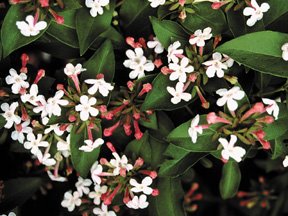
Abelia mosanensis
This relatively rare Abelia is worth looking for if you enjoy fragrance in the garden.
It is a noteworthy because unlike any other Abelia it is highly fragrant, and very hardy - Zone 4.
I obtained this plant from a Latvian woman I met in Germany. I do not speak German or Russian, and she did not speak English but by pointing to some images and using botanical latin names I was able to show my interest in obtaining some plants. With the help of email, a translator and fedex I had this wonderful plant within six months.
Abelia mosensis as it turns out is actually a Korean native. It forms its flower buds in autumn and blooms in spring. The buds appear reddish-pink and the open to white. The fragrance is as good as Hyacinths or Korean Spice Viburnum. It is a most delightful plant to have in the garden.
The plant is a large, somewhat loose plant with glossy simple leaves that matures around 6ft. In the Autumn the foliage turns shades of orange and red.
We introduced this plant some 5 years ago and it is loved by all who have grown it.
For More Information on Cool New plants visit the ColorChoice Website

I was going thru your blog during my lunchtime (hitting links from other gardening bloggers). I was actually looking to go to January of 2007, but hit the 2006 by mistake (read: I was paying attention to the year).
ReplyDeleteWhat serindipity! I have seen this advertised by one of my favorite plant suppliers and have been interested in it, but thought that the zone 4 rating was probably stretching it by one or two zones. Now I have confirmation that it is more hardy than I would have thought and and gives me more reason to look at it a bit harder.
Thanks!
I just planted it this fall. Its a small sapling. How long does it take to grow?
ReplyDeleteAbelia mosanensis grows fairly fast and turns into a 6' shrub. As a young plant it requires a bit of pruning to build a decent body but the effort is well worth it. It looks a bit rangy as a young plant, so pinch the growing tips often when it is growing to build a well barnched plant.
ReplyDeleteEnjoy.
When do you prune the fragrant Abelia? After it blooms or in the fall?
ReplyDeletePrune it right after it blooms. This is a good rule of thumb for all flowering shrubs.
ReplyDeletebonjour
ReplyDeleteje suis fan de plantes à parfums : jasmin,cestrum nocturnum,hedychium...
j'ai installé cet abelia en pleine terre
il sent très bon
la fleur est belle
le feuillage d'automne est superbe
mais je ne comprends pas comment le tailler :
-rabattre les nouvelles pousses au 1/3 après la floraison
-recépage ?
je ne sais pas
My French is a bit rusty, but I will try my best to answer. Unlike the common Abelia x grandiflora this Abelia forms it flower bud in the Autumn. So if you do prune it do so right after it flowers in the spring. Mature plants require little pruning, but young plants need to be pruned or sheared to build a body.
ReplyDeleteTo cut back, means to prune or shear the plant.